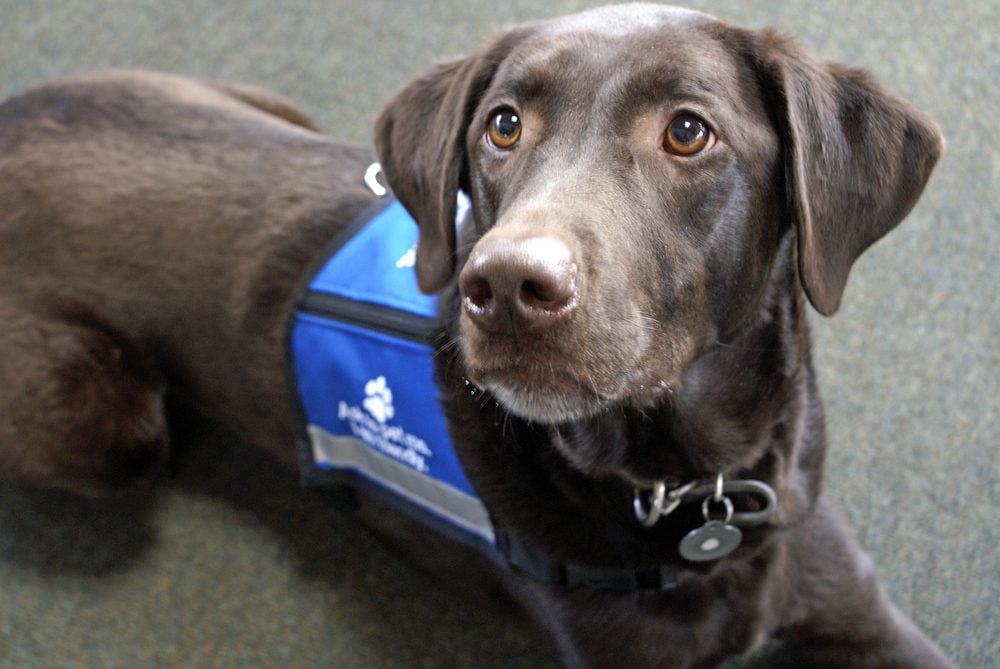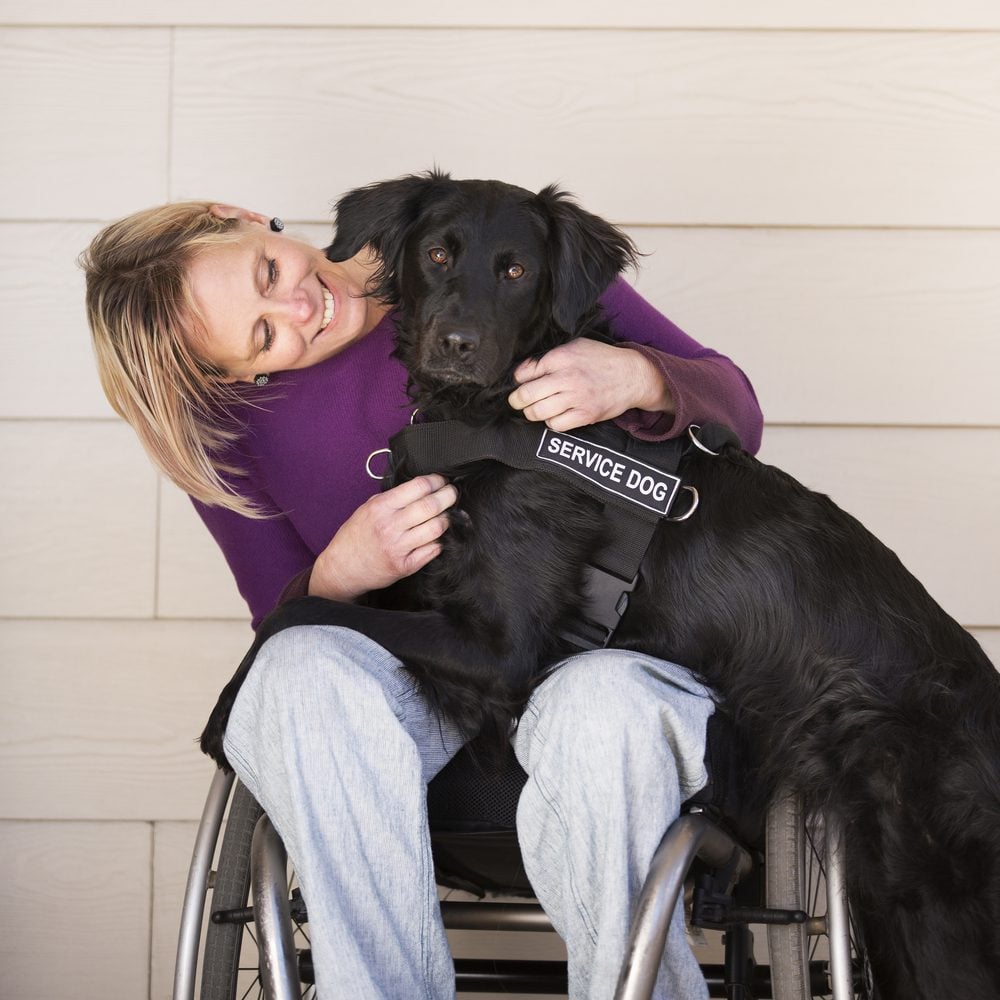If you’re living with a disability in Kansas, it might be worth training your pooch (or a new puppy) to become a service dog. Not only do these lovable creatures provide invaluable assistance with everyday tasks, but they also receive legal protections under federal and state laws.
The Americans with Disabilities Act (ADA) affords anyone with an eligible disability the right to bring a service dog into any “public accommodation” (restaurants, entertainment venues, retail stores, educational institutions, etc.). Businesses, landlords, and airlines cannot charge for a service dog or treat the owner differently, providing the animal is housebroken and well-behaved.
Because the ADA is a federal law, all states must abide by it along with their own laws. In Kansas, most of the laws protecting service animals are in line with the ADA. However, there are some minor differences.
For instance, under the ADA, businesses and other such entities are not allowed to ask for proof that your dog is a service animal. Under Kansas law, service dog handlers may present businesses with an ID card that includes the name and contact information of the handler as well as a photo of the handler and the dog.
Another difference is that Kansas law, unlike the ADA, also protects service dogs that are still in training. This means that service dogs-in-training have access to all the same public places as a fully-trained service dog. However, this only pertains to dogs being trained by professionals from recognized training centers.
Although no formal certification or registration requirements are required by the ADA, a canine must be adequately trained to qualify as a service dog. This article will cover what to consider when searching for a service dog trainer and then review the top five providers in Kansas.
What to Look For When Choosing Service Dog Training
Choosing an appropriate service dog training center is the first step towards turning a canine companion into a bonafide service animal.
Regardless of whether you choose an online or in-person trainer, it’s best to stick with an established operator with years (or decades) of industry experience. Look for a provider with a proven track record with your specific disability.
Not all trainers work with every dog. But that’s not necessarily a bad thing—it could mean they excel at training a specific breed. Some insist on working with a custom-bred puppy, while others accept existing pets (after a rigorous evaluation) or source animals from a local shelter. In any case, check whether these conditions align with your needs.
For a brick-and-mortar establishment, it’s worth assessing the facilities in person before committing. Are the kennels in good shape? Do the dogs have plenty of open space? A low-quality trainer will cut corners and deliver subpar results.
While a sizable waiting list is indicative of a successful business (or a popular non-profit), you should consider your own timeline as well. For example, if you need an animal trained in a hurry, there’s no point joining a five-year waiting list.
Finally, cost is a crucial consideration. While the law requires a service dog to be capable of supporting its owner, there’s no legal requirement to enlist a professional trainer. An online training course gives you the necessary tools to train your animal at home and saves you thousands compared to an in-person program.
Online vs. In-Person Service Dog Training
So what’s the best option for training a service dog: in-person or online? Both methods have their advantages, which we’ll discuss below.
While an in-person course requires you to attend scheduled classes, an online program lets you train your animal at your convenience—you don’t even need to leave the comfort of your own home. The most significant benefit, however, is cost. Online programs give you all the support and guidance you need at a fraction of the price of an in-person course.
Although rigid and expensive, in-person programs may achieve better results because an experienced professional provides expert, tailor-made training sessions. Furthermore, the in-person option puts less burden on the owner, essential when a severe disability renders self-training impractical. Both humans and canines also get ample opportunity to socialize and exercise—active and outgoing owners often find in-person training more fun.
| Pros of Online Service Dog Training | Pros of In-Person Service Dog Training |
| Cost-effective: online courses cost a fraction of the price of in-person programs | Less owner burden: trainers do most of the work, essential for people with severe disabilities. |
| Convenience: train your dog at a time that’s suitable for you | Expertise: in-person trainers draw on years of experience to achieve optimal results |
| Comfort: no need to leave the comfort of your own home | Exercise and socialization: you and your dog will get out and about |
The Best Service Dog Training in Kansas



Now that you’re up to speed, it’s time to check out the top service dog training programs in Kansas, both in-person or online. We’ve searched long and hard to identify and review the top courses in the state to make the selection process easier for you.
US Service Animals Online Training
The top dog in virtual training, US Service Animals Online Training, gives you everything you need to teach your canine to become a service dog from home. The six-module program consists of 12 easy-to-follow videos that outline cutting-edge animal behavior theories and how they apply to your four-legged friend. Unlike other online programs, you’ll get customized support from a professional service dog trainer throughout the course.
The comprehensive program teaches your pet to assist with various disabilities, including blindness, hearing loss, diabetes, mobility issues, and epilepsy. No breed or size restrictions apply, and you get a handy certificate at the end (there’s also an optional service vest, collar, collar tag, and leash).
Cost: $349
Location: Online only (6 video modules)
Certificate: Yes
1:1 Support: Yes
Equipment Provided: Clicker, plus optional service vest, collar, collar tag, and leash
Mutt School
Mutt School helps clients train their own dogs to become service dogs using pain-free and fear-free methods that don’t rely on intimidation or other such tactics. You are part of your dog’s training every step of the way, so you’ll be prepared to reinforce what your dog learned after you finish the training program. Mutt School offers discounts on continuing education in case you and your dog ever need a refresher. They also have a scholarship program called MuttCare that qualifying owner-trainers can apply to for financial assistance.
Cost: Contact for details
Location: In-person (Manhattan, Junction City, Ft. Riley, St. Marys, Wamego, Silver Lake, Topeka, Abilene, and Salina, KS.)
Certificate: No
1:1 Support: Yes
Equipment Provided: None
Family Dog Training & Behavorial Center
Family Dog Training & Behavorial Center is owned by Kelly Spencer, a Certified Professional Dog Trainer-Knowledge Assessed through the Certification Council of Professional Dog Trainers. She’s also an IAABC Supporting member, a certified Evaluator for both Therapy Dogs International and the American Kennel Club’s Canine Good Citizen Test, as well as a member of the Association of Professional Dog Trainers. Their service dog training program focuses on Psychological Support Dogs that are trained to lessen the symptoms of PTSD, and they will either help you find a dog to train or work with your own dog.
Cost: Contact for details
Location: Wichita, KS
Certificate: Contact for Details
1:1 Support: Yes
Equipment Provided: Contact for Details
